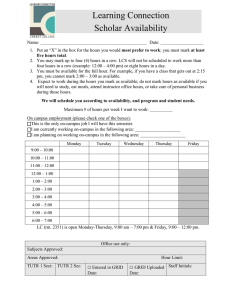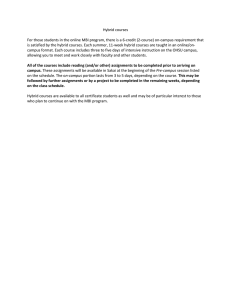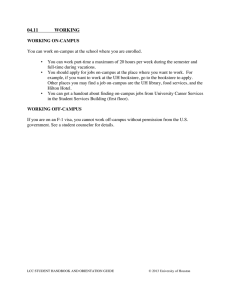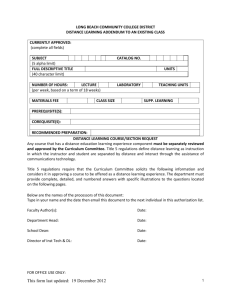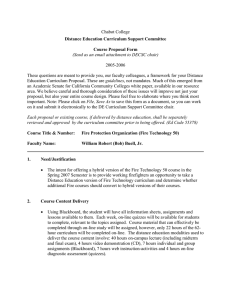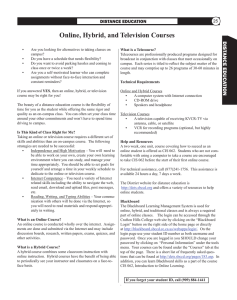Fall 2016 Saturday Lecture (9:45 -12:30 HN 1028) Lab (1:10
advertisement
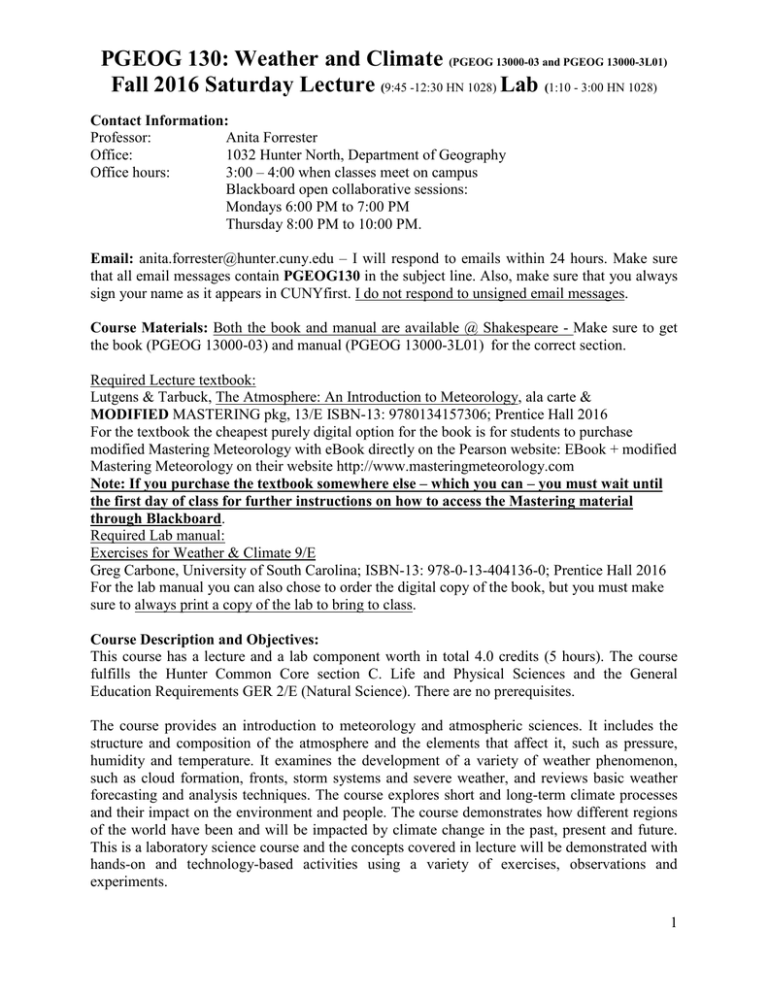
PGEOG 130: Weather and Climate (PGEOG 13000-03 and PGEOG 13000-3L01) Fall 2016 Saturday Lecture (9:45 -12:30 HN 1028) Lab (1:10 - 3:00 HN 1028) Contact Information: Professor: Anita Forrester Office: 1032 Hunter North, Department of Geography Office hours: 3:00 – 4:00 when classes meet on campus Blackboard open collaborative sessions: Mondays 6:00 PM to 7:00 PM Thursday 8:00 PM to 10:00 PM. Email: anita.forrester@hunter.cuny.edu – I will respond to emails within 24 hours. Make sure that all email messages contain PGEOG130 in the subject line. Also, make sure that you always sign your name as it appears in CUNYfirst. I do not respond to unsigned email messages. Course Materials: Both the book and manual are available @ Shakespeare - Make sure to get the book (PGEOG 13000-03) and manual (PGEOG 13000-3L01) for the correct section. Required Lecture textbook: Lutgens & Tarbuck, The Atmosphere: An Introduction to Meteorology, ala carte & MODIFIED MASTERING pkg, 13/E ISBN-13: 9780134157306; Prentice Hall 2016 For the textbook the cheapest purely digital option for the book is for students to purchase modified Mastering Meteorology with eBook directly on the Pearson website: EBook + modified Mastering Meteorology on their website http://www.masteringmeteorology.com Note: If you purchase the textbook somewhere else – which you can – you must wait until the first day of class for further instructions on how to access the Mastering material through Blackboard. Required Lab manual: Exercises for Weather & Climate 9/E Greg Carbone, University of South Carolina; ISBN-13: 978-0-13-404136-0; Prentice Hall 2016 For the lab manual you can also chose to order the digital copy of the book, but you must make sure to always print a copy of the lab to bring to class. Course Description and Objectives: This course has a lecture and a lab component worth in total 4.0 credits (5 hours). The course fulfills the Hunter Common Core section C. Life and Physical Sciences and the General Education Requirements GER 2/E (Natural Science). There are no prerequisites. The course provides an introduction to meteorology and atmospheric sciences. It includes the structure and composition of the atmosphere and the elements that affect it, such as pressure, humidity and temperature. It examines the development of a variety of weather phenomenon, such as cloud formation, fronts, storm systems and severe weather, and reviews basic weather forecasting and analysis techniques. The course explores short and long-term climate processes and their impact on the environment and people. The course demonstrates how different regions of the world have been and will be impacted by climate change in the past, present and future. This is a laboratory science course and the concepts covered in lecture will be demonstrated with hands-on and technology-based activities using a variety of exercises, observations and experiments. 1 Expected Learning Outcomes: Upon completion of the course the student will be able to: 1. Understand the scientific method and use it to solve problems in meteorology and climate studies. 2. Understand, explain and appreciate the interconnected nature of the Earth systems through effective oral and written communication. 3. Identify major geographic features (both physical and human) on map and globe. 4. Explain the relationship between the Sun and the Earth and the Sun's planetary impact on weather and climate. 5. Understand the interaction between the elements of the atmosphere, including a. the composition and the structure of the atmosphere, and its distribution around the planet, including the basic chemistry and physics of atmospheric processes b. the atmospheric and oceanic circulation processes, and c. fronts, storm systems and severe weather with an emphasis on North America 6. Interpret methods of weather forecasting and be able to utilize weather forecasting tools and techniques, as well as interpret and create basic weather maps. 7. Understand and evaluate climate processes and how they relate to the past, present and future climate and their impact on biogeography, including a. current technology and science in predicting meteorological outcomes b. natural and anthropogenic climate change c. the impact created by shifts in climate zones Preliminary Class Schedule: Part 1: Intro, Chapter 1- 5 Part 2: Chapters 6-9 Part 3: Chapters 10-15 > > > Exam 1 (10/08) Exam 2 (11/5) Exam 3 (12/17) A more detailed schedule will be posted on the Blackboard site and is included below. Please check it often as the schedule can and will change depending on discussion times. Updates will be posted reflecting these changes. Course delivery: This course will run as a hybrid section, meaning that not all class sessions will be held in the classroom at Hunter College. Some of the sessions will be conducted online through Blackboard discussion sessions with the lecture content delivered through online delivery mode using a combination of PowerPoint and Mastering content as well as utilizing a “flipped” classroom method which allows us to discuss material that you will have previewed prior to meeting in the classroom. “The flipped classroom is a pedagogical model in which the typical lecture and homework elements of a course are reversed. Short video lectures are viewed by students at home before the class session, while in-class time is devoted to exercises, projects, or discussions.” I am very excited to share with you these non-traditional delivery methods as I found in my experience that students learn and retain more using these methods. Whether we meet in class or on-line, I will have virtual office hours twice a week to discuss content, answer questions or just to share and discuss material relevant to our course and to the field of earth science. 2 Grading policy: Exams Mastering Assignments Map Quizzes 35% 25% 10% Lab Exercises Pre-Lab Quizzes 25% 5% Exams: Exams will be a mix of multiple choice, true/false and fill-in-the-blank and short answer questions. Mastering Assignments: There will be assignments to be completed for each chapter that we cover in class before the beginning of the next class each week Map quizzes: You will have 7 map quizzes during the semester. These will be administered during the lecture on the scheduled days. The locations for each quiz are posted on BB along with blank maps to help you prepare. There are no make-up opportunities for the scheduled map quizzes. Weekly Laboratory Exercises: There will be lab assignment to be completed before the beginning of the next on-campus meeting, and these labs are always due at the beginning of lab. Missing class does not excuse you from completing or submitting the material that was covered, assigned or that was due that day. Grades for late labs will be reduced by 20 points for each day they are late, unless you have a documented excuse. As we meet only once a week and many of you work during the week, you may scan and send me your (entire, completed, and legible) lab to show that you have done it if you have a sudden emergency as long as the email is received prior to the lab start date (1:10pm) with an acceptable explanation of why you are absent and a hard copy of the lab must be submitted for grading the following Saturday. You may also leave a lab in my mailbox in the office if it is late, but it must be dated and signed by a member of the office staff. All labs must be submitted in neat, legible handwriting, with all calculations and units of measurements shown. If I cannot read or understand an answer, it is wrong. Photocopied labs will not be accepted. Labs that are not submitted in a timely manner will receive a grade of zero. Weekly Pre-Lab quizzes: You are expected to prepare for your lab class by reading the lab exercise and reviewing your lecture notes and textbook chapter relating to the lab exercise before you arrive in lab. There will be a 10 minute quiz at the beginning of lab to test your general knowledge of the lab subject. If you read the lab exercise before lab and review your notes and textbook chapter you will be able to answer the questions. There are no make-up opportunities for missing the scheduled missed pre-lab quizzes. Incomplete Policy: There will be NO INCOMPLETES (with the exception of a death, serious illness, or work related issues such as travel). Incompletes must be requested in writing prior to the last class session (unless of an unforeseen emergency as outlined above) and will be given only if student’s grade is at “C” or above at the time the IN is filed, and with evidence of a satisfactory reason. At the time you request an IN you must also complete a Contract to Resolve an Incomplete Grade (form available at the college) and get my signature. Otherwise, I will average your existing grades based on the course grading rubric and record the grade you have earned. To receive a CR/NC you must have completed all the course requirements (exams, quizzes, etc.) and have requested the CR/NC option prior to beginning the final exam. Based on 3 your final score you will be assigned as a letter grade based on the numerical standards that can be found in the Hunter College Undergraduate Catalogue at http://catalog.hunter.cuny.edu/ Course Policies Attendance is an integral part of the course. Missing lecture whether it’s an on-campus or hybrid session will negatively impact your performance as there will be things discussed and reviewed in class that are not in your textbook. Since we meet only once a week, missing a single Saturday session is the equivalent of missing two lectures, or an entire week of regular classes. After the first full day absence, any additional full day or equivalent absence will result in a 5 point deduction from your final grade. Lecture 1 is scheduled from 9:45 – 11:00; Lecture 2 is from 11:15 – 12:30; Lab is from 1:10 – 3:00. Attendance will be monitored and recorded during each of the lecture sessions, both on-campus and hybrid. Any work assigned must be completed before the next class session begins whether you are in class or not. Missing a lecture class does not excuse you from completing and submitting the material that was assigned or that was due that day. If you know you will miss a class, you may scan and send me any assignment that may be due as long as I receive it before class begins. If you miss an exam for a satisfactory and documented reason you must contact me within two days of the missed exam deadline to schedule a make-up at a mutually convenient time. After that the grade will be automatically a zero. Classroom Electronics Policy: All personal electronics, such as phones, laptops, tablets, etc., must be silenced AND put away or turned off before coming into the classroom. There is no need to use a laptop/tablet/iPad during lecture, however you may use it in lab after the instruction portion of the lab is over. If it becomes a distraction to you and/or the people around you, I will ask you to shut it off. Blackboard: Make sure that your Blackboard account is active and that you know how to use it. We will use BB extensively in this course so please make sure that you familiar with the application before the course begins. I will use it for course related work, send out assignments, reminders and emails. There will be classwork and assignments that are Blackboard-based (i.e.,. exams, quizzes, discussion, etc.) and it will be the delivery method for on-line lectures, discussions, and office hours. We will go over these in our first class session – but please email me as soon as you find that you can’t find something or don’t know how to get to an activity. I will not be responsible for work that you miss because you do not check your @myhunter email account or you didn’t check BlackBoard. Hunter College Policy on Academic Integrity Hunter College regards acts of academic dishonesty (e.g., plagiarism, cheating on examinations, obtaining unfair advantage, and falsification of records and official documents) as serious offenses against the values of intellectual honesty. The College is committed to enforcing the CUNY Policy on Academic Integrity and will pursue cases of academic dishonesty according to the Hunter College Academic Integrity Procedures. ADA Policy: In compliance with the American Disability Act of 1990 (ADA) and with Section 504 of the Rehabilitation Act of 1973, Hunter College is committed to ensuring educational parity and 4 accommodations for all students with documented disabilities and/or medical conditions. It is recommended that all students with documented disabilities (Emotional, Medical, Physical, and/or Learning) consult the Office of AccessABILITY, located in Room E1214B, to secure necessary academic accommodations. For further information and assistance, please call: (212) 772-4857 or (212) 650-3230. Syllabus Policy: Except for changes that substantially affect grading, this syllabus is a guide for the course and is subject to change with advance notice. These changes will be announced in class and through Blackboard announcements. Make sure to check Blackboard regularly. PRELIMINARY COURSE SCHEDULE – SEE BB FOR UPDATES Lecture Schedule 1 27-Aug x 3-Sep No classes scheduled 2 10-Sep Chapter 1: Intro to the Atmosphere 3 17-Sep Ch 2: Heating Earth's Surface and Atmosphere 4 24-Sep Ch 3: Temperature 5 1-Oct Ch 4: Moisture and Atmospheric Stability 6 8-Oct Ch 5: Forms of Condensation and Precipitation; catch-up 7 15-Oct Exam 1 (Chs 1-5); Ch 6: Air Pressure and Winds 8 22-Oct Ch 7: Circulation of the Atmosphere 9 29-Oct Ch 8: Air Masses; Documentary (TBA) 10 5-Nov Ch 9: Mid-Latitude Cyclones; catch-up 11 12-Nov 12 19-Nov x 26-Nov 13 3-Dec Ch 13: Air Pollution; Ch 15: World Climates 14 10-Dec Ch 14: The Changing Climate 15 17-Dec Final Exam (Chapters 10-15) Map Quiz Schedule On-campus session Intro to course Exam 2 (Chs 6-9); Ch 10: Thunderstorms & Tornadoes Ch 11: Hurricanes; Ch 12: Weather Analysis and Forecasting; North America On-campus session Hybrid session Ocean Currents On-campus session Hybrid session South America On-campus session Hybrid session Europe On-campus session Hybrid session Africa On-campus session Hybrid session Western and Central Asia On-campus session No classes scheduled Hybrid session Eastern Asia, Australia and Oceania On-campus session Hybrid session 5 Lab Schedule Lab Questions to Complete A: 1-13; B: 1-5; C1: Questions 1-2, C2: Questions 1-4; D1: Questions 1-4; D2: Questions 1a-1b; E: all On-campus session Pre-Lab 1A-1E (con't) A: 1-13; B: 1-5; C1: Questions 1-2, C2: Questions 1-4; D1: Questions 1-4; D2: Questions 1a-1b; E: all On-campus session 17-Sep Lab 1: Vertical Structure of the Atmosphere; Questions 1-28; 4 24-Sep Lab 2: Earth-Sun Geometry Questions 1-6 (use analemma for questions 4-6), 9-19 5 1-Oct Lab 3: The Surface Energy Budget; Lab 4: The Global Energy Budget Questions 1-15; Questions 1-4, 11-15 6 8-Oct Lab 5: Atmospheric Moisture Questions 10-24, 27-29 7 15-Oct Lab 6: Saturation and Atmospheric Stability Questions 1-23 Hybrid session 8 22-Oct Lab 9: Weather Map Analysis; Questions 1-9 On-campus session 9 29-Oct Lab 10: Mid-Latitude Cyclones Questions 1-17 Hybrid session 10 5-Nov Lab 12: Thunderstorms and Tornadoes Questions 1-15; On-campus session 11 12-Nov Lab 13: Hurricanes Questions 1-17 Hybrid session 12 19-Nov Lab 14: Climate Controls Questions 1-22 On-campus session x 26-Nov No classes scheduled 13 3-Dec Lab 15: Climate Classification Questions 1-26 Hybrid session 14 10-Dec Lab 16: Climate Variability and Change Questions 1-23 On-campus session 1 27-Aug Pre-Lab 1A-1E x 3-Sep No classes scheduled 2 10-Sep 3 Hybrid session On-campus session Hybrid session On-campus session 6
